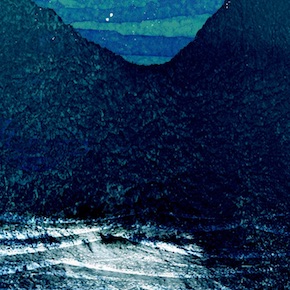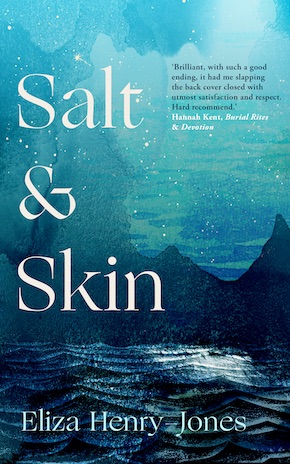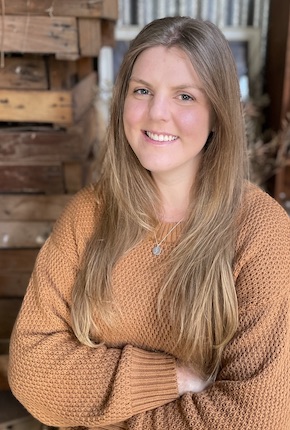Catastrophe on the shore
by Eliza Henry-Jones
The boat had seemed large at the dock, but now that they’re rumbling away from Big Island, it seems flimsy and ludicrously small.
Luda tries to think of the last time she’d been on a boat before coming to the islands. Years ago. Someone’s thirtieth birthday on the thick, marshy water of the Hopeturn River back home in Australia. Even back then, the river’s level had been low and the unpleasant smell of wet things made dry had permeated the boat, making people drink more than they should have.
Ewan whistles under his breath, doing whatever a seafarer does in the cabin of their boat. Luda’s two children, Darcy and Min, are out on the deck with her. Darcy, the eldest, is slouched against the gunwale, looking as though he’s waiting for a late bus that’s going to take him from one bland place to another. Min, two years younger, clutches at a pile of rope (Luda notices, but does not point out, that it’s not fastened to anything). Min is pale and looks almost bewildered by the world viewed from the small and rumbling fishing boat. When she notices Luda’s gaze, she scowls. Fierce, fractious little Min who is not so little anymore. Fourteen, Luda thinks, with the usual jolt of shock. She’s fourteen.
Ewan cuts the engine and the boat immediately begins a slow spin in the currents. The strangely intimate sound of water against the side of the boat. Ewan comes out of the cabin, his beanie low over his eyes. ‘You can really see the erosion of the cliffs from here,’ he says, and points.
Figures walk along the sand, leaving silvery footprints, their pants rolled up. Shoes in hand. Now cavorting, chasing each other. A mother and child.”
Of course. Luda has almost forgotten why she’s here. Almost. They have been here a week. Ewan is trying to help her find her feet as quickly as possible, so that she can get to work documenting the damage climate change is doing to these islands: taking photos, writing funding applications. It is, she knows, not a particularly popular topic in the local fishing circles. Through his subcontracting to the council for these sorts of climate change adjacent projects, Ewan has made himself something of a pariah. Still, he smiles at them now, smelling of coffee and brine. He looks far older than twenty-seven.
Luda studies the shoreline Ewan’s pointing to. It’s low tide now, the sea pulled back to reveal a short, sloped skirt of rippling sand up to the base of an overhanging, rocky cliff. Figures walk along the sand, leaving silvery footprints, their pants rolled up. Shoes in hand. Now cavorting, chasing each other. A mother and child, Luda thinks, but the shore’s a bit too far away to be sure.

She cocks her digital SLR camera, focuses on the cliff face, the beach, the figures which (with her camera’s zoom) she can now make out more clearly. Yes, a little girl with curling bronze-red hair. She looks six or seven or eight. She is with a muscular woman who is perhaps in her mid-thirties. Luda follows them for a moment with her lens. What she sees is the easy intimacy of a parent and child at this age – the way the child’s body still touches the parent’s without thought. The mindless, automatic easiness of it. Had Luda ever appreciated it the way she should have? She misses it now.
She feels like a voyeur. They’d have no reason to imagine a camera trained on them from the fishing boat. The idea gives her a little thrill, shivery and darting.
‘Sandstone,’ Ewan says. ‘You can make out the bands of it, see?’
Luda has noticed that Ewan engages in quick, heavy bursts of interaction and then retreats back into himself. He continues to talk about erosion and deposition behind her, further along on the deck. He will be talking to Min, but it is Darcy who will be listening closely, storing the information up in that terrifying vault of a brain he has. Min tends to let information trickle over her, off her, like water. She remembers the broad strokes and how they fit together. Darcy has always been preoccupied with the finest details of a thing.
Luda snaps a few frames. She inspects them and is impressed by the mood of the midwinter light, which she had expected to be glaring or dull. She lifts the camera back to her eye, trains it back on the cliffs. And then the world collapses.
Min and Darcy watch their mother, still peering through the lens of her camera. ‘Jesus,’ Darcy says over the throb of the engine. ‘Mum, put it down!’”
A cracking sound. A flurry of movement as sheets of rock fall onto the narrow, sloping beach. Stillness, and then the awful keening of a woman parted from her child.
‘Allie? Allie! Allie!’
Swearing, Ewan hurtles into the cabin, fires up the engine and begins making calls on his phone. For a moment, the three Managans are alone on the deck. Min and Darcy watch their mother, still peering through the lens of her camera.
‘Jesus,’ Darcy says over the throb of the engine. ‘Mum, put it down!’
Luda looks up. Her face is bright, almost feverish. Her horror has twisted itself into something that makes Darcy show his teeth.
Ewan eases the boat as close as he can to the shore, and then he drops the anchor and throws himself off the side into the water. He swims until he can touch the sandy bottom, then he begins an awkward lunging.
Darcy follows, his freestyle strokes unpractised but still somehow graceful. Min, who has never swum more than a few strokes here and there, hangs over the boat’s edge, white-faced. Luda, who can swim better than either of her children, stands up.
Min spins around. ‘Don’t! Don’t go.’
Min has always been the bolder of her children – the sort who insisted on dressing herself from before she was two, who used to scream until Luda unhitched the leading line from her pony’s bridle. The panic in her voice is new, and so Luda sits down on the deck, holding her camera in both hands.
On the shore, Ewan helps the woman dig frantically through the rubble. Darcy stands in the shallows, staring up at the cliff face, from which stones still trickle.
‘Move!’ he yells, his voice carrying over the water.
Ewan looks up, but the woman, bloody-fingered from the scrape of the rocks, does not.
Ewan grunts and pulls the woman away from the rubble. She fights him. Fingernails and teeth. ‘Let me go! Let me go! Allie!’
Darcy moves quickly to the beach where he wraps a long arm around the woman’s waist. She continues to writhe, to kick. To scream. It takes both Darcy and Ewan to pull her away from the cliff face.
Min sits down, shuts her eyes and covers her ears. Luda thinks, unbidden, of red hair tangled under rocks. Blood. No. She can’t. She cannot.
Luda has long known that the world is full of awful things and that if you let them inside you, if you let yourself linger or think, they’ll damage you, these things, as surely as a gun or poison or the flash of a man’s fist.
ISO. Shutter speed. Aperture. Luda squeezes the camera like she’s holding someone’s hand. She raises her camera, takes another photo, then another. Nobody sees. It’s just skin. That’s all she can capture of a person: skin. Luda feels like a ghost. Quicksilver. She thinks that this is her power.
from Salt and Skin (September Publishing, £12.99)
—

Eliza Henry-Jones is a writer and academic based on a flower farm in the Yarra Valley of Victoria, Australia. Her previous novels have been listed for multiple literary awards and her work has been published in the Guardian, Country Style, The Big Issue and The Age. She has qualifications in psychology as well as grief, loss and trauma counselling. Salt and Skin was published in Australia and New Zealand by Ultimo Press in 2022, and is now published in the UK and North America by September Publishing.
Read more
elizahenryjones.com.au
@elizahenryjones
@septemberbooks
Eliza Henry-Jones, Writers’ Paths: Trials, trauma and women’s tales

